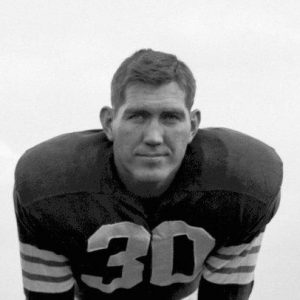calsfoundation@cals.org
Lewis Glen (Lew) Carpenter (1932–2010)
Lewis Glen (Lew) Carpenter had a long career in football, playing in high school, college, and in the National Football League (NFL). He played for the Arkansas Razorbacks from 1949 to 1952, followed by three NFL league championship teams. After ten years as a professional player, he had long career as an NFL coach.
Lew Carpenter was born on January 12, 1932, to Verba Glen Carpenter and Edna Earl Pullam Carpenter in Hayti, Missouri. He and his younger brother, Preston Carpenter, grew up in West Memphis (Crittenden County), where he attended high school and played football. In 1951, he married Beverly Ann Holt from nearby Earle (Crittenden County). The couple had four daughters: Cheryl, Cathy, Lisa, and Rebecca.
Accepting a scholarship at the University of Arkansas (UA) in Fayetteville (Washington County), the 6’1″, 220-pound Carpenter starred at the halfback position under coach John Barnhill and then Otis Douglas. He also played wide receiver, was positioned at tight end, and served as back-up quarterback during his college years. As a senior, he played in the Blue-Grey College All-Star Game. A versatile athlete, he received varsity letters in football and baseball. He graduated with a BS in biology.
After college, Carpenter played baseball in 1953 in the minor leagues as a pitcher with the Winston-Salem Cardinals of the Carolina League, and had a .286 batting average. Scouts for the NFL had also offered him a contract, and Carpenter chose football over baseball.
In 1953, he was drafted by the Detroit Lions in the eighth round, ninety-seventh selection. In his rookie year as an offensive back, when he had not yet been in a game, he was sent from the bench to substitute for an injured defensive back. On the first play, he intercepted a pass and ran it back seventy-three yards for a touchdown. The Lions won the championship that year and were runners-up the next. (This was before the Super Bowl began.) Carpenter was the leading Lions rusher for the 1954 and 1955 seasons. He was drafted into the U.S. Army, however, and missed the 1956 season.
For the 1957 season, he was with the Cleveland Browns, who were runners-up for the championship title. One of his teammates was his younger brother Preston, also a Razorback star. In 1959, Carpenter moved to Vince Lombardi’s Green Bay Packers and they won the NFL championship in 1961 and 1962. Though primarily a running back, Carpenter played various positions and was third-string quarterback for the Packers. He moved up to the second string when starter Bart Starr was injured. Carpenter earned the nickname “coach” because he was always helping other players improve.
After a ten-year career as a player, he retired after the 1963 season, switching to coaching. Carpenter spent thirty-one years as an assistant coach in the NFL with the Minnesota Vikings (1964–1966), Atlanta Falcons (1967–1968), Washington Redskins (1969), St. Louis Cardinals (1970–1972), Houston Oilers (1970–1974), Green Bay Packers (1975–1985), Detroit Lions (1987–1988), and Philadelphia Eagles (1990–1994). He was offensive coordinator for the Atlanta Falcons and then for the Washington Redskins under Lombardi. Carpenter also coached Frankfurt, Germany, in the World League of American Football in 1996. After moving to New Braunfels, Texas, he concluded his coaching career at Southwest Texas State University. Because of health problems, he retired in 1996.
On November 14, 2010, Carpenter died from pulmonary fibrosis. A postmortem pathology report on his brain showed an advanced case of chronic traumatic encephalopathy (CTE) for which he had shown symptoms in late life. By that time, he was the eighteenth professional football player to be diagnosed with the disease. In honor of her father, Rebecca Carpenter, who had previous film experience, produced and directed a well-received documentary, Requiem for a Running Back, that explored the implications of this disease in football players.
Carpenter was inducted into the Arkansas Sports Hall of Fame and the University of Arkansas Sports Hall of Honor. The Lewis Carpenter University of Arkansas Scholarship was established in his memory through Chase Bank in New Braunfels.
For additional information:
“Obituary.” Arkansas Democrat-Gazette, November 16, 2010, p. 5B.
Pro Football Reference https://www.pro-football-reference.com/players/C/CarpLe00.htm (July 10, 2019).
W. W. Satterfield
Little Rock, Arkansas







Comments
No comments on this entry yet.